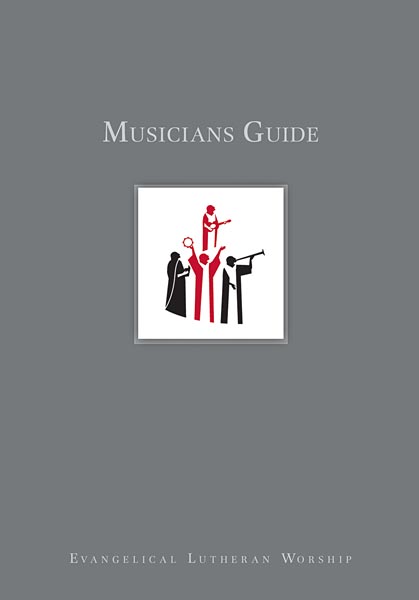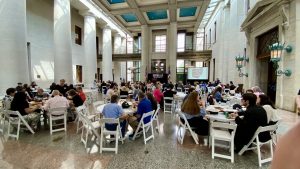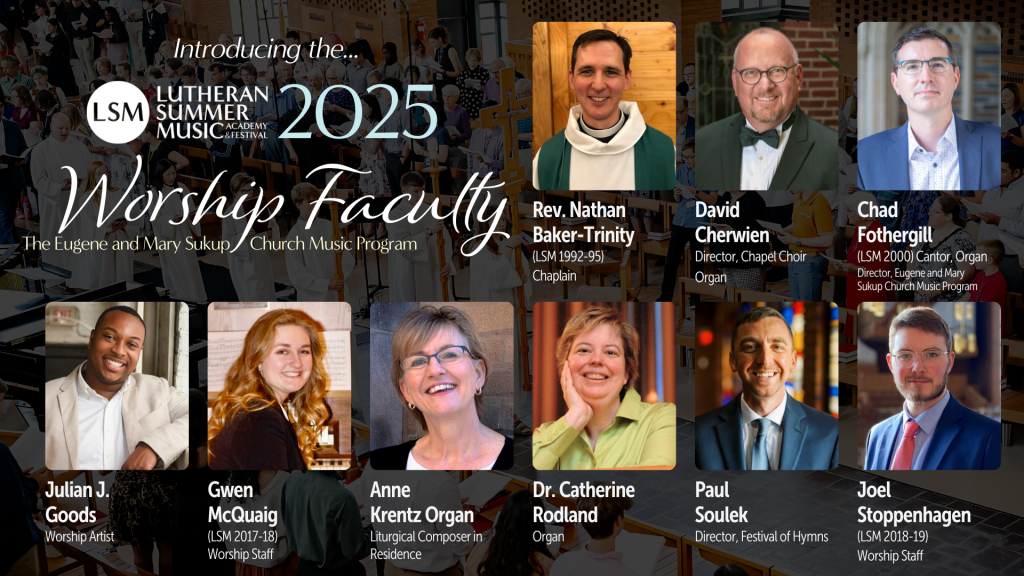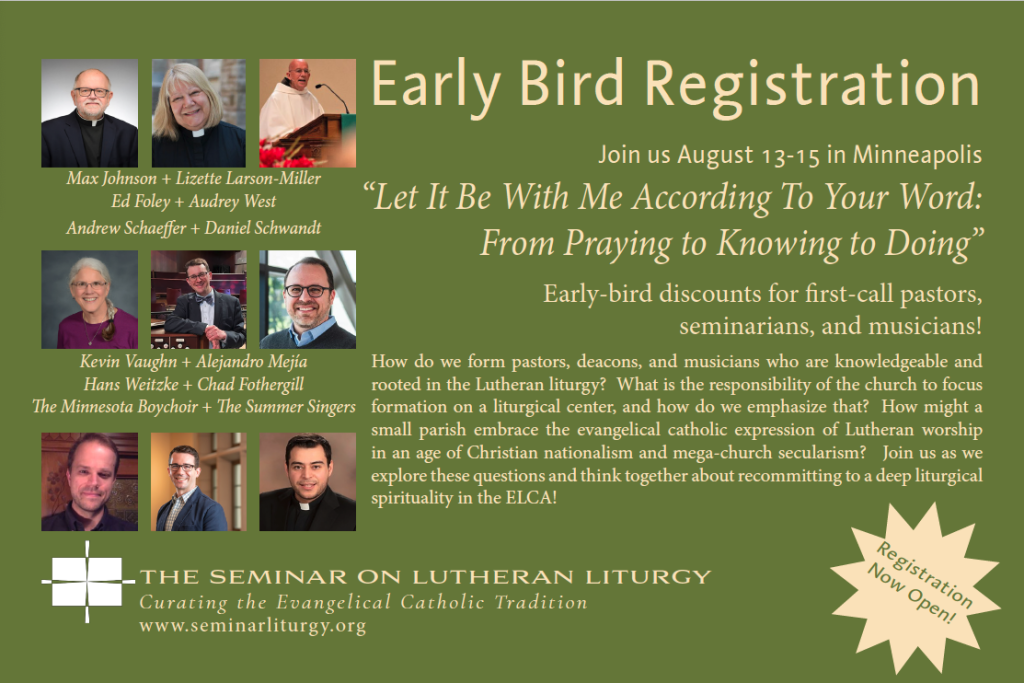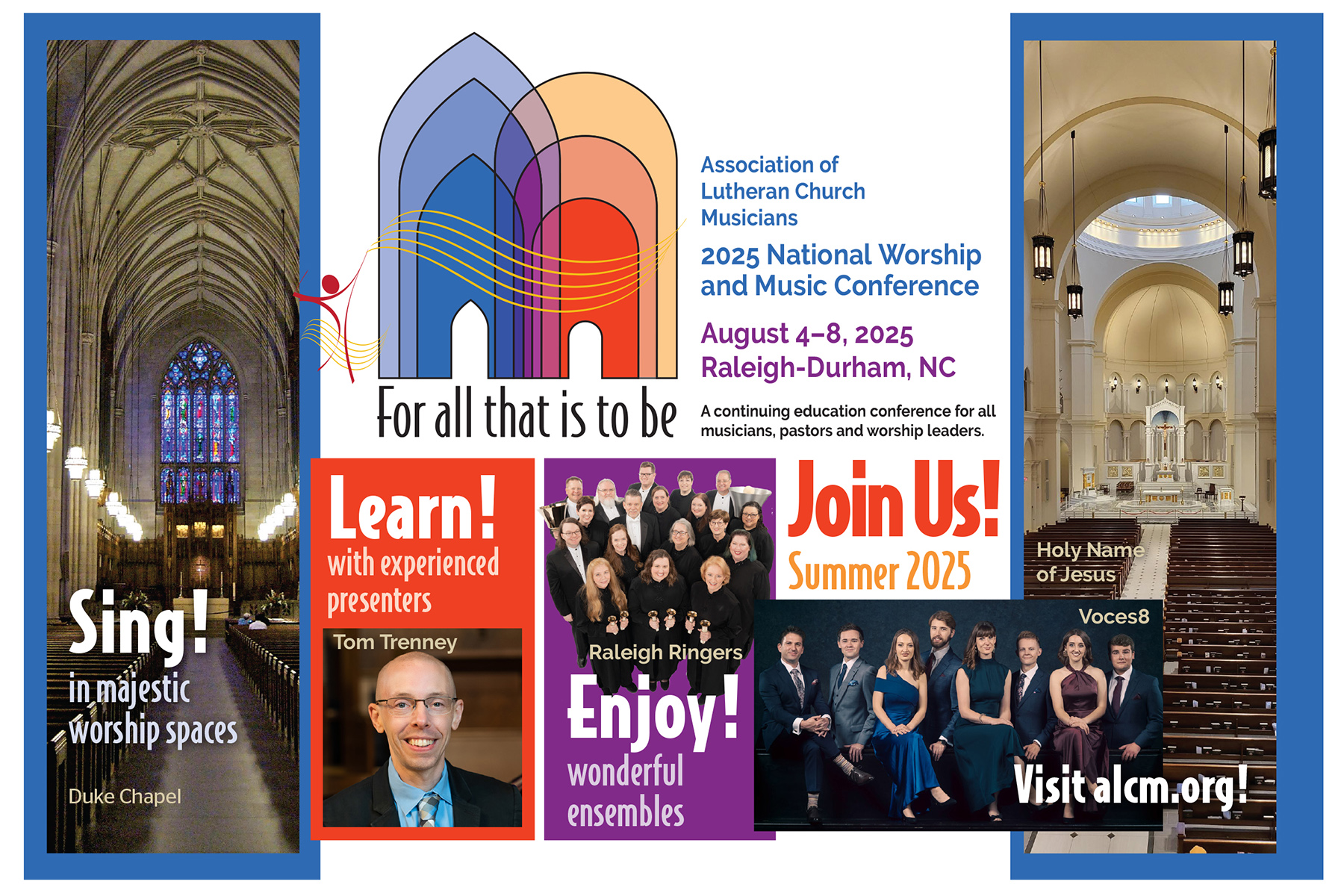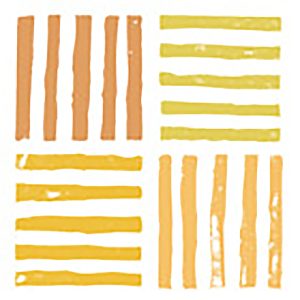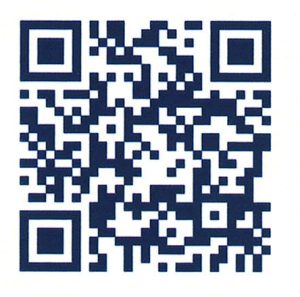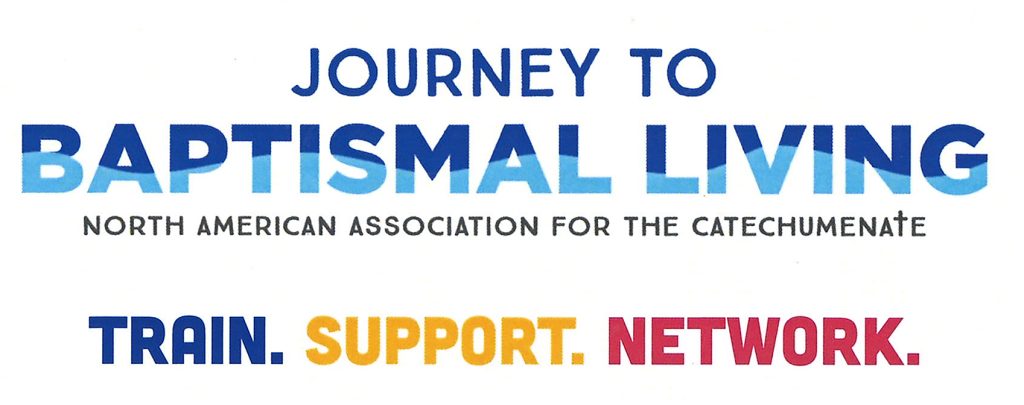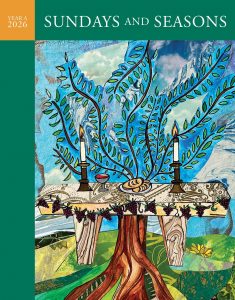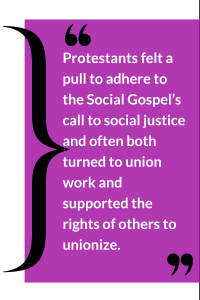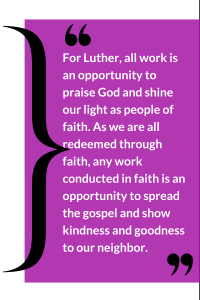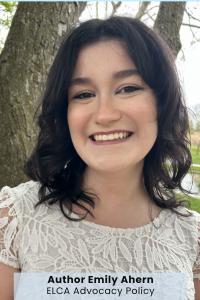from the ELCA advocacy office in Washington, D.C. – the Rev. Amy E. Reumann, Senior Director
BUDGET RECONCILIATION ADVANCES VIA COMMITTEE | FEMA THREATS | ADVOCACY WITH COMPANION CHURCHES | HUMANITARIAN AID TO GAZA | TAX REFORMS | MIGRATION POLICY UPDATES

 BUDGET RECONCILIATION ADVANCES VIA COMMITTEE: Individual committees in the House of Representatives have scheduled “mark up” dates to write up budget reconciliation text, with much happening the week of 5/12/2025. This comes after the House and Senate passed a shared budget resolution “blueprint” Apr. 14, which instructs committees to find “up-to” 2 trillion dollars in “pay-fors” for a wider tax cut package. A Call In Action Alert has been released to facilitate time-sensitive comments from the ELCA Advocacy Network to their representatives in this significant moment.
BUDGET RECONCILIATION ADVANCES VIA COMMITTEE: Individual committees in the House of Representatives have scheduled “mark up” dates to write up budget reconciliation text, with much happening the week of 5/12/2025. This comes after the House and Senate passed a shared budget resolution “blueprint” Apr. 14, which instructs committees to find “up-to” 2 trillion dollars in “pay-fors” for a wider tax cut package. A Call In Action Alert has been released to facilitate time-sensitive comments from the ELCA Advocacy Network to their representatives in this significant moment.
House and Senate Republicans have been at odds for weeks over the size of a tax cut package and whether it must be paid for with offsetting spending cuts. This intersects with several priority concerns in the ELCA, including:
- Considered cuts to Medicaid, including increasing work requirements for Able-Bodied Adults without Dependents, increasing federal-state cost-share for the program, or capping assistance for expanded Medicaid states.
- Potential reductions to SNAP and hunger federal funding, with some reports of seeking $230 billion in this area, possibly neutralizing future growth of the Thrifty Food Program and increasing the age limit for work requirements.
- Discussed $330 billion cut to federal student loan programs.
- Potential additional cuts to environmental programs that would roll back certain climate regulations (such as the fee on methane emissions and Environmental Protection Agency’s tailpipe emissions rule).
- Changes to Inflation Reduction Act’s tax credits intended to slow climate change and boost clean energy such as wind and solar power.
Why It Matters in the ELCA:
There are many reasons Lutherans are attending to our shared economic life. For example, the ELCA social statement Sufficient, Sustainable Livelihood for All distills: “Government is intended to serve God’s purposes by limiting or countering narrow economic interests and promoting the common good… Governing leaders are to be held accountable to God’s purposes: ‘May [they] judge your people with righteousness, and your poor with justice… May [they] defend the cause of the poor of the people’ (Psalm 72:2)” p. 11. Also, the ELCA social statement Caring for Creation states, “This church will favor proposals and actions that address environmental issues in a manner consistent with the principles of participation, solidarity, sufficiency, and sustainability” (p. 11).
What’s Next:
Treasury Secretary Scott Bessent indicated hopes that the House and Senate will find some compromise for a wider tax bill and send it to the president’s desk by July 4, but the GOP conference remains divided on whether they should cut spending even more or avoid cuts to critical low-income programs. ELCA advocacy staff shared Action Alerts on hunger, education, Medicaid and more over the last month, and will continue to encourage calls to action on priorities that impact the mission of our ministries as the committees deliberate text.
 FEMA THREATS: The U.S. Department of Homeland Security (DHS) has reportedly created a plan to dismantle critical disaster response, recovery and resilience operations at the Federal Emergency Management Agency (FEMA). The reported plan comes after the administration paused $700 million in resiliency funds from the Building Resilient Infrastructure and Communities (BRIC) program. Media reports indicate that the agency will be decimated with the Atlantic hurricane season just six weeks away.
FEMA THREATS: The U.S. Department of Homeland Security (DHS) has reportedly created a plan to dismantle critical disaster response, recovery and resilience operations at the Federal Emergency Management Agency (FEMA). The reported plan comes after the administration paused $700 million in resiliency funds from the Building Resilient Infrastructure and Communities (BRIC) program. Media reports indicate that the agency will be decimated with the Atlantic hurricane season just six weeks away.
Why It Matters in the ELCA:
With extensive experience and investment through Lutheran Disaster Response and local involvement, the ELCA advocacy team issued an Action Alert to mobilize members to call upon their elected officials to express concern about cutting or dismantling federal disaster response.
What’s Next:
The FEMA Council the administration established through Executive Order remains active. According to a DHS press release (4/28/25), President Trump has appointed 13 new members to the Council. Membership of the committee is centered around Gulf Coast states, and several members have some form of emergency management experience. Overall, ELCA advocacy staff and partners assess that this shows our advocacy and organizing against the dismantlement of FEMA is working, which can be counted as a positive development. The existence of the council will, at least, slow the dismantling process down. Regardless, the existence of this council means that our advocacy around the recent FEMA Request for Information are going to be a lot more impactful.
- This situation is constantly evolving; on 5/8/25, acting FEMA chief Cameron Hilton was forced out after breaking rank with DHS Secretary Kristi Noem and President Trump, and new FEMA head David Richardson told FEMA staff he would “run right over” anyone that resists changes, and that all delegation of authority in the agency is immediately suspended according to Reuters.
 ADVOCACY WITH COMPANION CHURCHES: This month, Dr. Paul Mmbando, the Director of Health Programs of the Evangelical Lutheran Church in Tanzania (ELCT), was hosted by ELCA D.C.-based staff and met with several congressional offices and committee staff to discuss the lifesaving importance of the President’s Emergency Plan for AIDS Relief (PEPFAR). He spoke of ways ELCT’s PEPFAR project known as Kizazi Hodari, funded through USAID, was instrumental in helping orphaned and vulnerable children in northern Tanzania thrive. The ELCT’s Kizazi Hodari project is one of many that has been prematurely terminated by the Trump administration due to change of U.S. policy.
ADVOCACY WITH COMPANION CHURCHES: This month, Dr. Paul Mmbando, the Director of Health Programs of the Evangelical Lutheran Church in Tanzania (ELCT), was hosted by ELCA D.C.-based staff and met with several congressional offices and committee staff to discuss the lifesaving importance of the President’s Emergency Plan for AIDS Relief (PEPFAR). He spoke of ways ELCT’s PEPFAR project known as Kizazi Hodari, funded through USAID, was instrumental in helping orphaned and vulnerable children in northern Tanzania thrive. The ELCT’s Kizazi Hodari project is one of many that has been prematurely terminated by the Trump administration due to change of U.S. policy.
- Through facilitation of Daudi Msseemmaa, ELCA Regional Representative to East Africa, Dr. Godson Maro, Chief of Party for the ELCT’s Kizazi Hodari program shared insights on the lifesaving ministry and it’s truncation through present U.S. policy in Episode 4 of Here I Pod from ELCA Advocacy.
Why It Matters in the ELCA:
Companion churches are a critical part of our church and of our advocacy efforts. They bring unique voices and perspectives to policy decisions. Many members of Congress are eager to hear from partners on the ground, who are often the ones experiencing the impact of policy decisions made far from their own communities. Dr. Mmbando found an audience that was keen to hear of ELCT’s experience with U.S. government foreign assistance programs as Congress charts a way forward. As a church that fosters relationships based on accompaniment, such connections are critical to faith-based advocacy.
What’s Next:
Since Dr. Mmbando’s visit, there have been follow-up conversations with congressional staff about ways Congress can continue supporting global health programs like PEPFAR and restore projects that have been abruptly terminated. ELCA advocacy staff will continue to engage these offices to ensure sustainability of these programs and encourage our advocate network to message Congress to restore funding. An Action Alert is available.
 HUMANITARIAN AID TO GAZA: Since Mar. 2, after the collapse of the ceasefire, the Israeli government has continued to block humanitarian aid and most provision of water into the Gaza Strip. At this juncture, most food stocks at UN and International Nongovernmental Organizations (INGOs) warehouses inside the Gaza Strip are depleted, and obtaining water is becoming extremely difficult.
HUMANITARIAN AID TO GAZA: Since Mar. 2, after the collapse of the ceasefire, the Israeli government has continued to block humanitarian aid and most provision of water into the Gaza Strip. At this juncture, most food stocks at UN and International Nongovernmental Organizations (INGOs) warehouses inside the Gaza Strip are depleted, and obtaining water is becoming extremely difficult.
The UN now estimates that Gaza is facing its worst humanitarian crisis since the start of the conflict on Oct., 2023. Provision of healthcare and emergency medical assistance in Gaza is now at its lowest ebb, with key medical supplies depleted and a lack of blood supplies. The Israel Defense Forces (IDF) bombing of the Episcopal affiliated al-Ahli Arab hospital on Apr. 13, 2025, further degraded the ability to provide healthcare services in North Gaza. Evacuation orders and the imposition of “military zones” in the Gaza Strip by the IDF has put 70% of the strip off limits to Gaza residents, cramming the Strip’s entire population into the remaining 30% of available land. It is estimated that at least 420,000 Gazans have been displaced since the ceasefire collapse in March.
Why It Matters in the ELCA:
The critical situation in Gaza and the ongoing conflict continues to directly impact the ELCA’s Lutheran siblings in the Holy Land, in addition to putting the wider Christian community of the Holy Land at further physical risk. The conflict is also further eroding and destroying the interfaith relationship between all three Abrahamic faiths, which is impacting the ELCA’s interfaith relationships here in the United States.
What’s Next:
ELCA advocacy staff accompanied an U.S.-Egypt Dialogue delegation to their congressional and State Department meetings during the week of Apr. 28. During these meetings ELCA staff including the Executive Director of ELCA Service & Justice brought up the need for the United States to put pressure on the Israeli government to lift the blockade on Gaza and allow humanitarian aid into the enclave. Additionally, the issue of the bombing of the al-Ahli Arab Hospital on Palm Sunday was news to several members of Congress who requested additional information about the situation with the hospital and about the overall situation with healthcare in Gaza. ELCA advocacy staff will continue to follow up and provide this information and work to pursue a bipartisan letter from Congress to the White House demanding to understand the White House’s strategy for protecting the Christian community in the Holy Land moving forward.
 TAX REFORMS: As Congress considers cuts to programs, House Ways and Means and Senate Finance is simultaneously considering tax cuts to bundle together in a wider reconciliation bill.
TAX REFORMS: As Congress considers cuts to programs, House Ways and Means and Senate Finance is simultaneously considering tax cuts to bundle together in a wider reconciliation bill.
Why It Matters in the ELCA:
The social statement Sufficient, Sustainable Livelihood for All references the need for a just tax code: “Paying taxes to enable government to carry out these and other purposes is an appropriate expression of our stewardship in society, rather than something to be avoided. Government often falls short of these responsibilities. Its policies can harm the common good and especially the most vulnerable in society. Governing leaders are to be held accountable to God’s purposes: “May [they] judge your people with righteousness, and your poor with justice… May [they] defend the cause of the poor of the people” (Psalm 72:2).
What’s Next:
Though the majority of tax relief is expected to benefit businesses, committee leaders have been approached by a large variety of proposals, including expanding the Child Tax Credit and passing new perks to low-income housing development. Earlier in April, Sen. Todd Young (R-IN) and Sen. Maria Cantwell (D-WA) reintroduced legislation to expand the Low-Income Housing Tax Credit Program, estimated to help create up to 1.6 million affordable homes over a decade by increasing the total tax credits allocated to states and easing some public financing requirements. Meanwhile, GOP lawmakers continue to debate the inclusion of an expanded Child Tax Credit (CTC), which could involve an inflation value increase which would make the credit permanent, adding a baby-bonus (an explored way by the administration to increase the country’s birth rate), and more. A variety of lawmakers are hoping introduced tax bills from this spring will be included in the wider reconciliation package. ELCA advocacy staff shared an Action Alert on the CTC last month and will continue to track these bills as they advance in Congress.
 MIGRATION POLICY UPDATES: While the position of ELCA Program Director for Migration Policy is unfilled, monitor @ELCAammparo on Facebook and the ELCA AMMPARO Blog for current activity.
MIGRATION POLICY UPDATES: While the position of ELCA Program Director for Migration Policy is unfilled, monitor @ELCAammparo on Facebook and the ELCA AMMPARO Blog for current activity.
Receive monthly Advocacy Connections directly by becoming part of the ELCA Advocacy network – http://elca.org/advocacy/signup , and learn more from elca.org/advocacy .
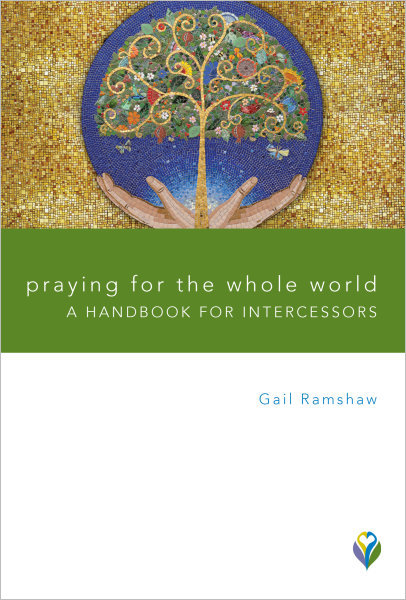 Praying for the Whole World: A Handbook for Intercessors
Praying for the Whole World: A Handbook for Intercessors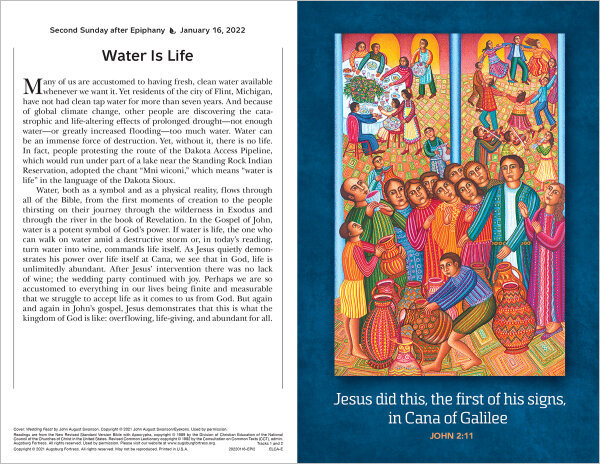 Weekly Bulletin and Lectionary Insert Service
Weekly Bulletin and Lectionary Insert Service 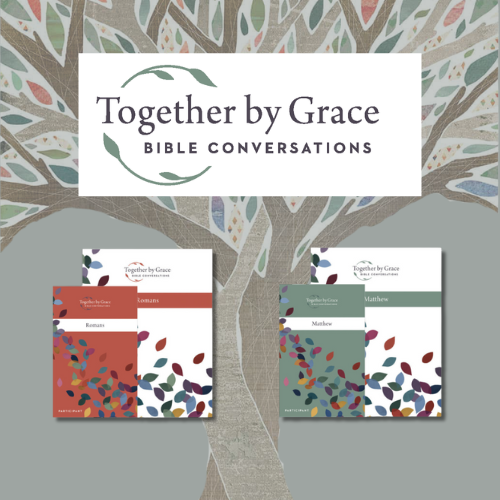 Together by Grace: Bible Conversations
Together by Grace: Bible Conversations 
